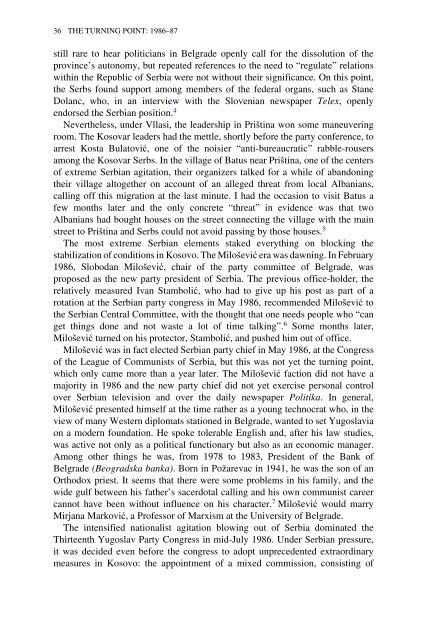Yugoslavia: A History of its Demise - Indymedia
Yugoslavia: A History of its Demise - Indymedia
Yugoslavia: A History of its Demise - Indymedia
Create successful ePaper yourself
Turn your PDF publications into a flip-book with our unique Google optimized e-Paper software.
36 THE TURNING POINT: 1986–87<br />
still rare to hear politicians in Belgrade openly call for the dissolution <strong>of</strong> the<br />
province’s autonomy, but repeated references to the need to “regulate” relations<br />
within the Republic <strong>of</strong> Serbia were not without their significance. On this point,<br />
the Serbs found support among members <strong>of</strong> the federal organs, such as Stane<br />
Dolanc, who, in an interview with the Slovenian newspaper Telex, openly<br />
endorsed the Serbian position. 4<br />
Nevertheless, under Vllasi, the leadership in Priština won some maneuvering<br />
room. The Kosovar leaders had the mettle, shortly before the party conference, to<br />
arrest Kosta Bulatović, one <strong>of</strong> the noisier “anti-bureaucratic” rabble-rousers<br />
among the Kosovar Serbs. In the village <strong>of</strong> Batus near Priština, one <strong>of</strong> the centers<br />
<strong>of</strong> extreme Serbian agitation, their organizers talked for a while <strong>of</strong> abandoning<br />
their village altogether on account <strong>of</strong> an alleged threat from local Albanians,<br />
calling <strong>of</strong>f this migration at the last minute. I had the occasion to visit Batus a<br />
few months later and the only concrete “threat” in evidence was that two<br />
Albanians had bought houses on the street connecting the village with the main<br />
street to Priština and Serbs could not avoid passing by those houses. 5<br />
The most extreme Serbian elements staked everything on blocking the<br />
stabilization <strong>of</strong> conditions in Kosovo. The Milošević era was dawning. In February<br />
1986, Slobodan Milošević, chair <strong>of</strong> the party committee <strong>of</strong> Belgrade, was<br />
proposed as the new party president <strong>of</strong> Serbia. The previous <strong>of</strong>fice-holder, the<br />
relatively measured Ivan Stambolić, who had to give up his post as part <strong>of</strong> a<br />
rotation at the Serbian party congress in May 1986, recommended Milošević to<br />
the Serbian Central Committee, with the thought that one needs people who “can<br />
get things done and not waste a lot <strong>of</strong> time talking”. 6 Some months later,<br />
Milošević turned on his protector, Stambolić, and pushed him out <strong>of</strong> <strong>of</strong>fice.<br />
Milošević was in fact elected Serbian party chief in May 1986, at the Congress<br />
<strong>of</strong> the League <strong>of</strong> Communists <strong>of</strong> Serbia, but this was not yet the turning point,<br />
which only came more than a year later. The Milošević faction did not have a<br />
majority in 1986 and the new party chief did not yet exercise personal control<br />
over Serbian television and over the daily newspaper Politika. In general,<br />
Milošević presented himself at the time rather as a young technocrat who, in the<br />
view <strong>of</strong> many Western diplomats stationed in Belgrade, wanted to set <strong>Yugoslavia</strong><br />
on a modern foundation. He spoke tolerable English and, after his law studies,<br />
was active not only as a political functionary but also as an economic manager.<br />
Among other things he was, from 1978 to 1983, President <strong>of</strong> the Bank <strong>of</strong><br />
Belgrade (Beogradska banka). Born in Požarevac in 1941, he was the son <strong>of</strong> an<br />
Orthodox priest. It seems that there were some problems in his family, and the<br />
wide gulf between his father’s sacerdotal calling and his own communist career<br />
cannot have been without influence on his character. 7 Milošević would marry<br />
Mirjana Marković, a Pr<strong>of</strong>essor <strong>of</strong> Marxism at the University <strong>of</strong> Belgrade.<br />
The intensified nationalist agitation blowing out <strong>of</strong> Serbia dominated the<br />
Thirteenth Yugoslav Party Congress in mid-July 1986. Under Serbian pressure,<br />
it was decided even before the congress to adopt unprecedented extraordinary<br />
measures in Kosovo: the appointment <strong>of</strong> a mixed commission, consisting <strong>of</strong>
















